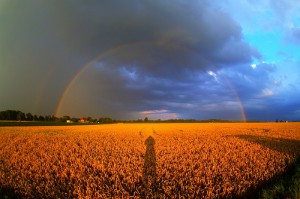 Dorothy’s wonder at being transported into another world in the 1939 film, The Wizard of Oz, has become one of the most popular tropes of American cinema. “We’re not in Kansas anymore” is ranked fourth in the American Film Institute’s list of top 100 Hollywood movie quotations. As a sense of dislocation became part of our common experience, Dorothy’s words found resonance, and the film itself became a classic by connecting with cultural themes of disorientation and the longing for something more familiar. “There’s no place like home.”
Dorothy’s wonder at being transported into another world in the 1939 film, The Wizard of Oz, has become one of the most popular tropes of American cinema. “We’re not in Kansas anymore” is ranked fourth in the American Film Institute’s list of top 100 Hollywood movie quotations. As a sense of dislocation became part of our common experience, Dorothy’s words found resonance, and the film itself became a classic by connecting with cultural themes of disorientation and the longing for something more familiar. “There’s no place like home.”
As if hit by a Kansas twister, very little in the structures of religion in post-war American society seems to have remained in place.
As if hit by a Kansas twister, very little in the structures of religion in post-war American society seems to have remained in place. Mainline Protestantism’s religious and cultural dominance has given way to religious pluralism, a spirituality of “dwelling” to a spirituality of “seeking,” assumed religious affiliation to the exercise of individual choice, centralization in religious institutions to fragmentation—in all these instances the norms of religious life in the United States are far from what they used to be. Other new developments in American religion include:
- The decline of denominationalism and the rise of religious entrepreneurship.
- The hardening of religious identity, not along the lines of classic religious traditions, but according to positions carved out by what is often labeled the “culture wars,” in which religious identity is defined in large measure in opposition to other persons, communities, and beliefs.
- The rise of the religiously unaffiliated, or “nones,” alongside the “spiritual but not religious” and the “new atheists.”
- The development of new forms of religious association, including the “new monasticism,” the emerging church, the house church movement, and Internet-based religiosity.
- The de-Europeanization of American Christianity due to the influx of Christian immigrants from around the globe.
- The rise of non-Christian religious traditions in the United States—also due primarily to immigration—and the ensuing rise in interfaith relations.
- The increased globalization of religious networks, associations, and conflict, along with a growing sense of religious interdependence on a global scale.
- The waning interest in joining religious institutions, contrasted with renewed interest in religious experiences.
- The fading of religious formation and religious literacy among both youth and adults.
- The increasingly negative public image of the church, especially in light of highly publicized scandal and abuse.
- The greater interest, especially among youth, in religious practices (particularly service) over religious dogma.
Part of the Collegeville Institute’s mission is to serve as a hub for vital and hopeful conversations about contemporary religious life even as that life is on the move.
Struggling against such a whirlwind of change, segments of the church, with the best of intentions, seem intent on keeping up appearances and continuing business as usual. Change is threatening; inertia is powerful. Part of the Collegeville Institute’s mission is to serve as a hub for vital and hopeful conversations about contemporary religious life even as that life is on the move. At the Collegeville Institute, while we acknowledge that there are many tragic elements of the journey from Kansas to Oz, we also view the contemporary religious landscape as a vibrant setting for engaging the Christian tradition in compelling and fresh ways. We might not be in Kansas anymore, but a rainbow may be in sight.
 Since its inception in 1967, the Institute has gathered diverse groups of people from various faith communities to connect faith to the world and its pressing social issues. These efforts create unlikely networks and friendships with far-reaching and unpredictable consequences. Our new blog, On Our Minds, aims to extend this work to the digital sphere.
Since its inception in 1967, the Institute has gathered diverse groups of people from various faith communities to connect faith to the world and its pressing social issues. These efforts create unlikely networks and friendships with far-reaching and unpredictable consequences. Our new blog, On Our Minds, aims to extend this work to the digital sphere.
In the middle of the massive restructuring of religiosity, both in the U.S. and on a global scale, the Collegeville Institute aims to help promote new forms of religious life—religious life that emerges out of shared explorations across traditions and allows God to shape us in new ways to be new people and new communities of faith.
We hope this blog encourages readers and writers to examine the intersection of religion and culture in a spirit of wonder and exploration. You’ll find analysis that highlights both positive and negative implications of contemporary religious life—on a wide variety of topics ranging from current events, theology, religious practices, and the life of institutions. The blog is intended to be interactive and to reflect a diverse set of voices. In that vein, the contents of blog entries are not necessarily representative of the Collegeville Institute. Rather, our hope is that On Our Minds will continue and expand the transformative conversations, storytelling, and bridge-building that has always been central to the Collegeville Institute’s mission. We hope you’ll slide into your ruby slippers and join the adventure.
Images: Selak, Bill. Red Shoes. Available from: Flickr Commons.
H. Raab. Rainbow. Available from: Flickr Commons.
Like this post? Subscribe to have new posts sent to you by email the same day they are posted.



Leave a Reply